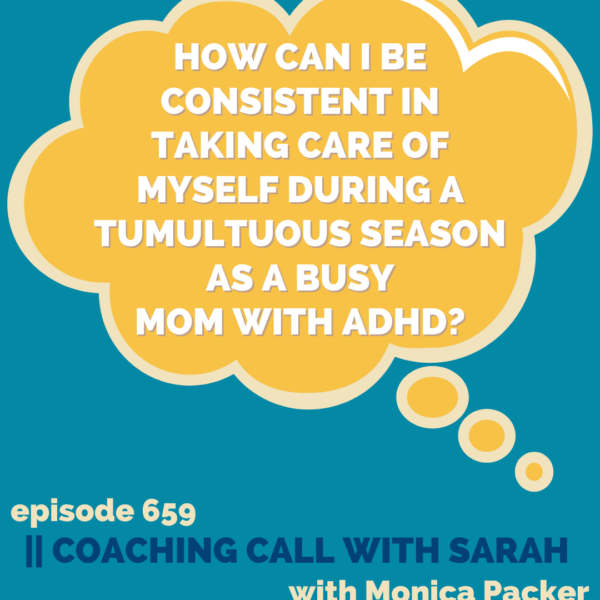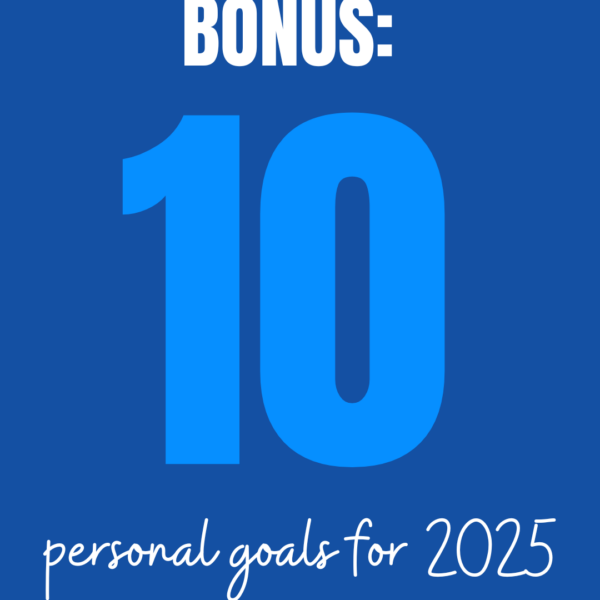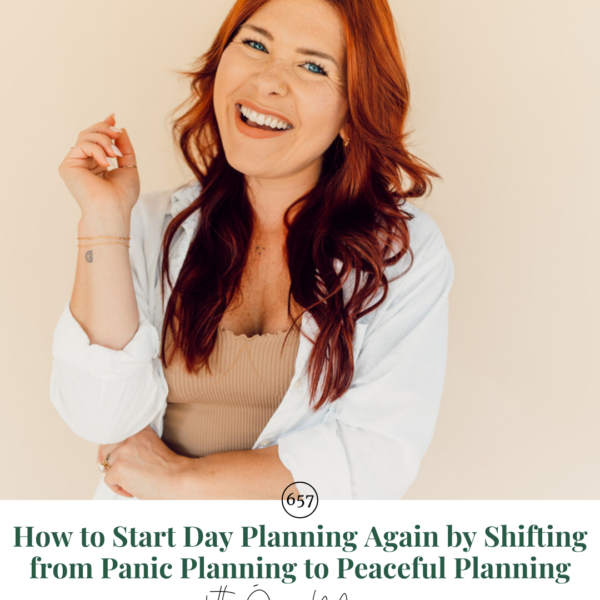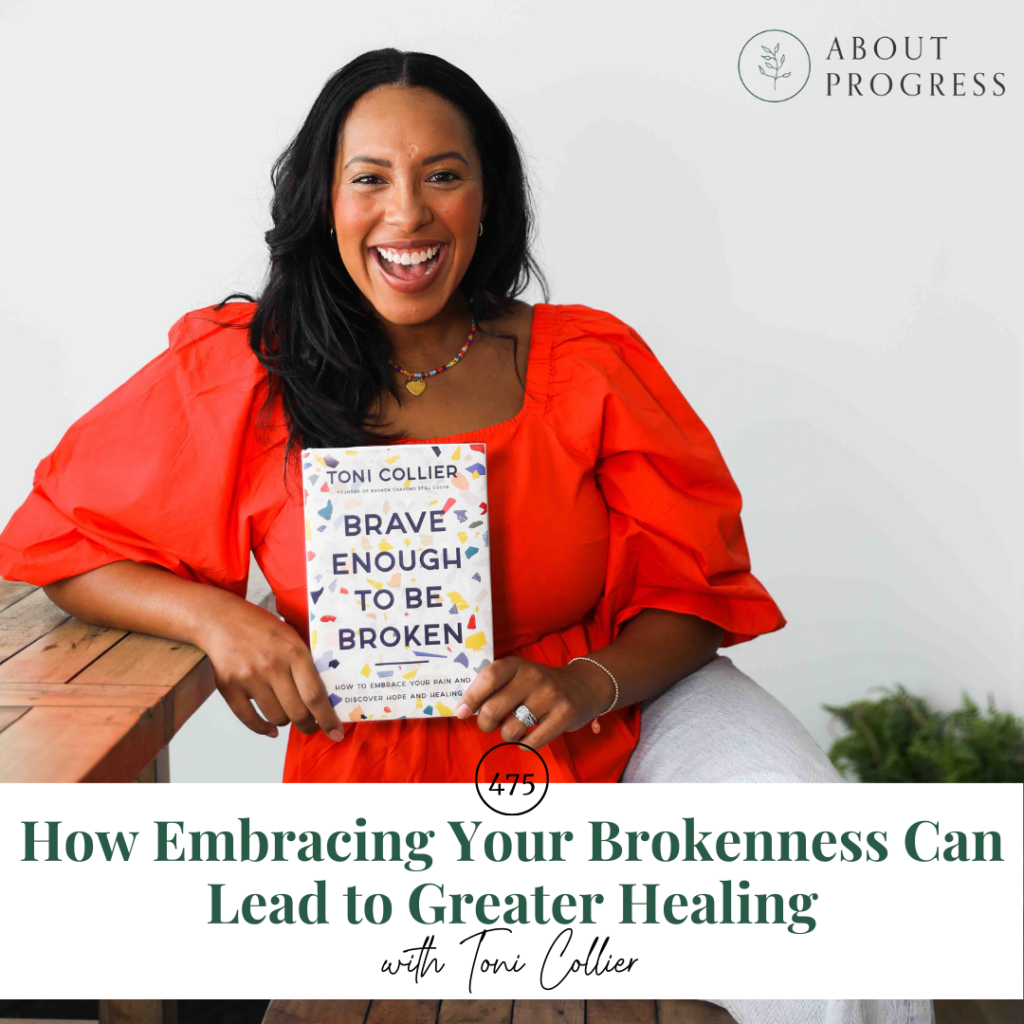
Toni Collier is a Hope Coach, author of Brave Enough to Be Broken and the founder of Broken Crayons Still Color, an international women’s ministry that helps women process their brokenness and reclaim hope. Her passion is to show women that they can be both broken and beautiful as they work out their healing.
If you have ever felt “broken” then you are not alone. I, too, spent YEARS thinking that I was especially broken—meaning too broken; broken beyond repair to fix. I’ve felt this way with recovering from eating disorders, when honestly there was no “recovering” happening, to major issues within my marriage and parenting, and even to some regular small issues I face like maybe being the world’s worst texter.
Toni’s personal story of living a double life of perfectionism to find approval outside of abusive relationships is absolutely inspiring. If you’re ready to break free from whatever brokenness is holding you back then this episode is the perfect place to start towards healing.
Episode references: Internal Family Systems, Boundaries For Your Soul, Replenishment Cycle from Tom Paterson
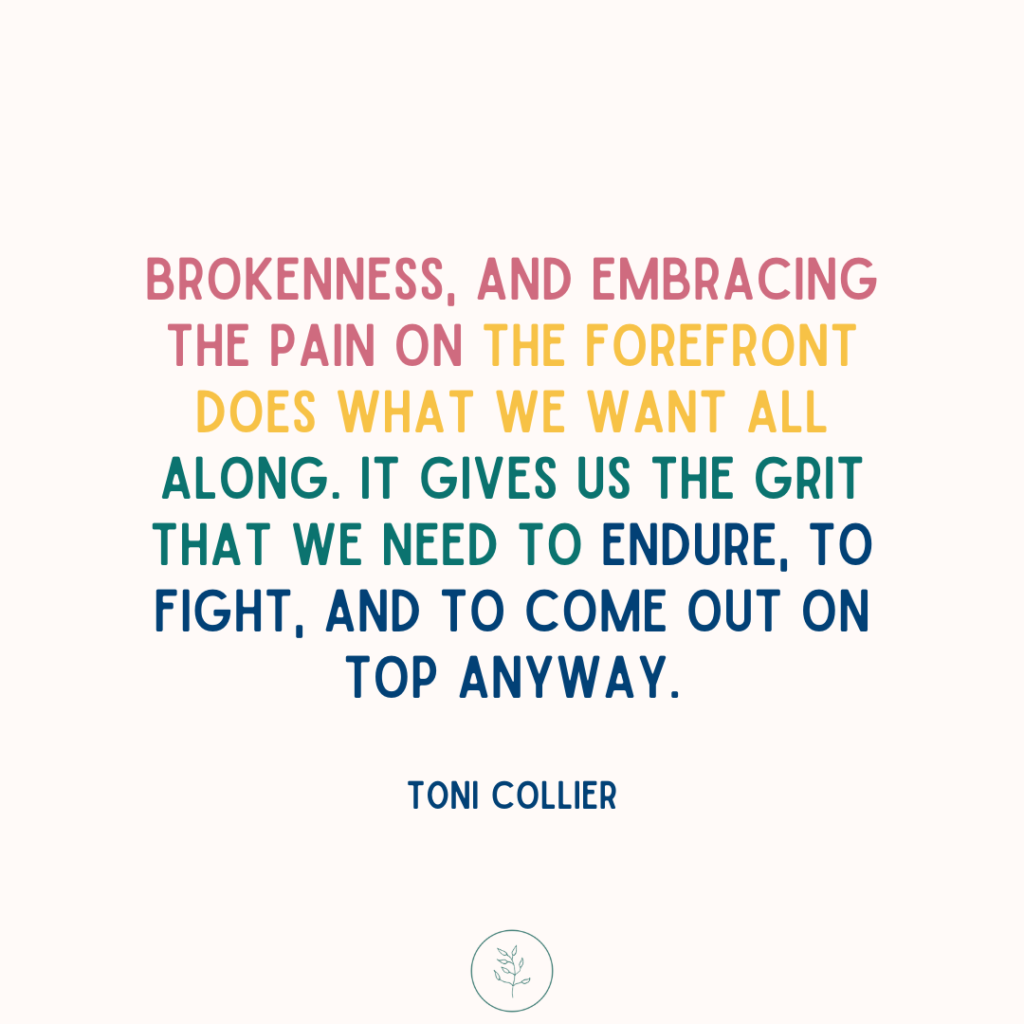
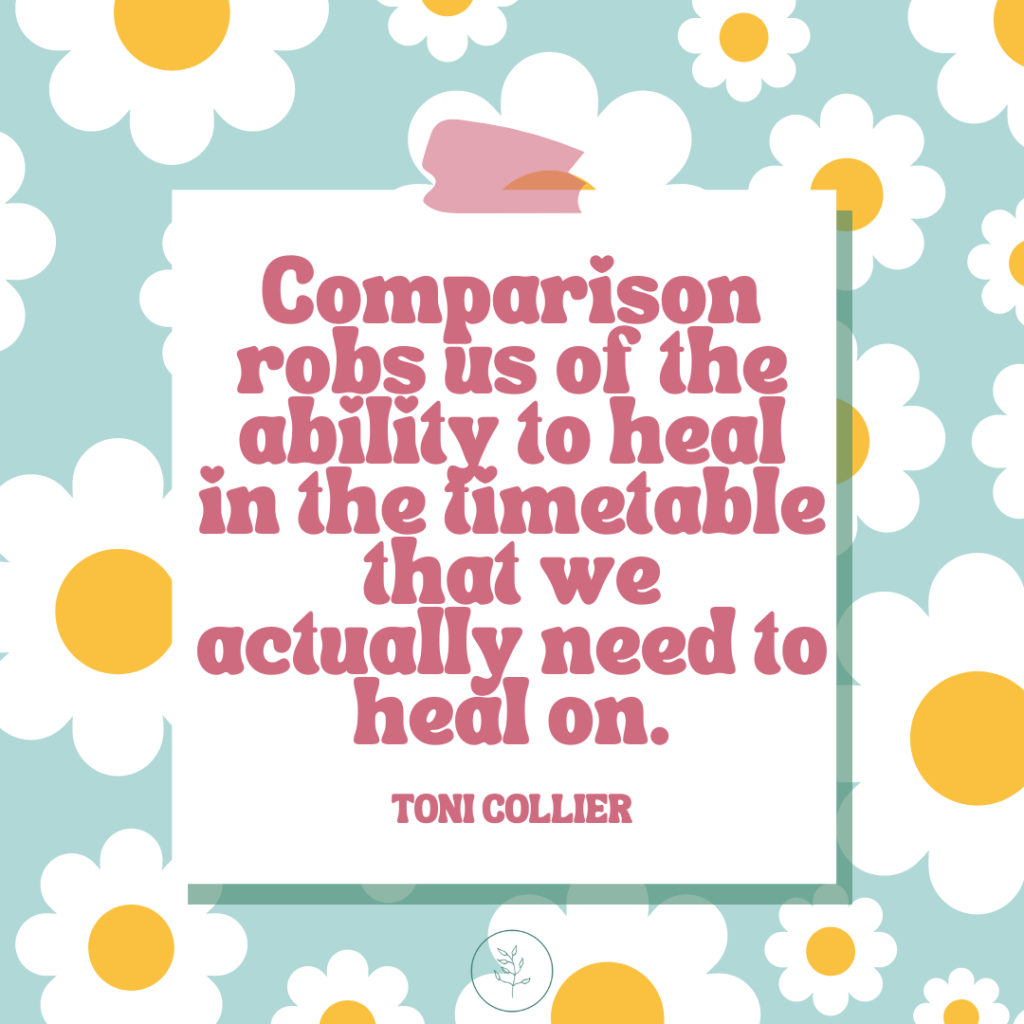
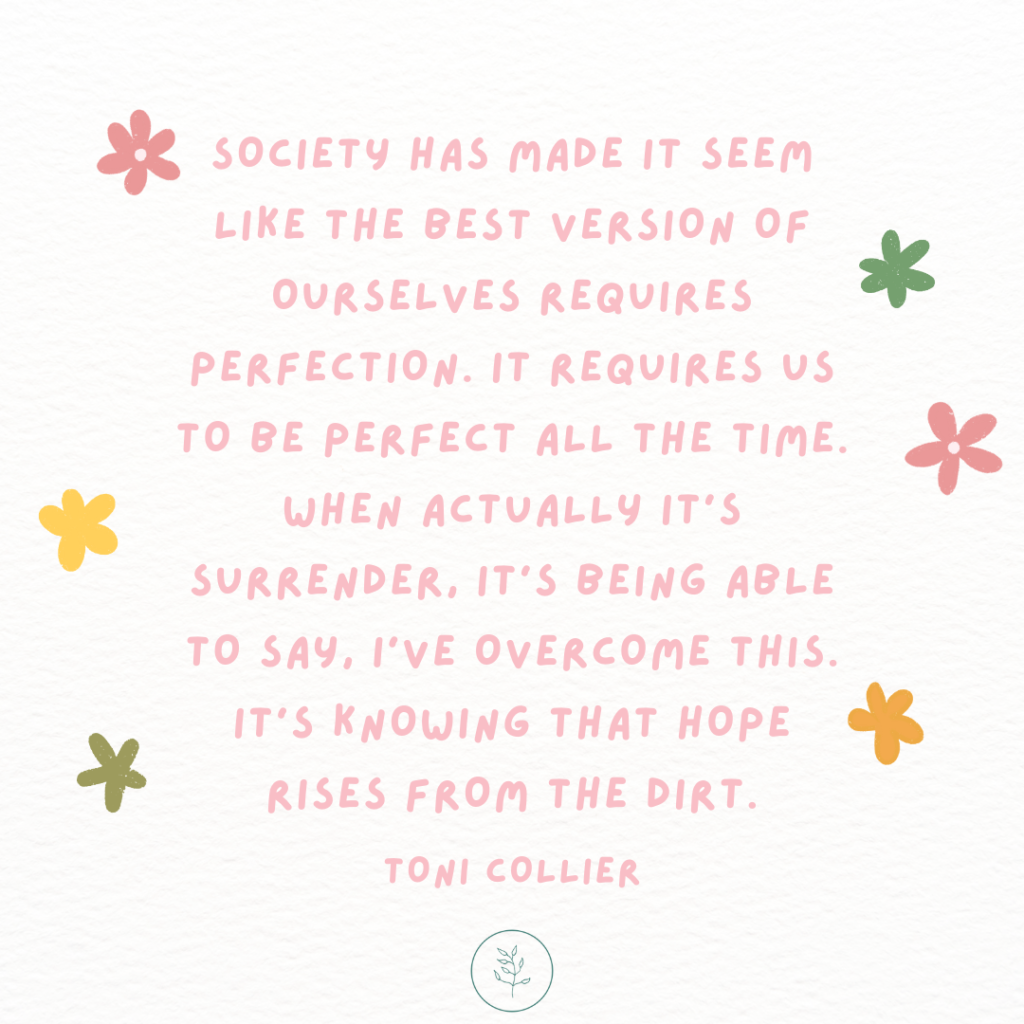
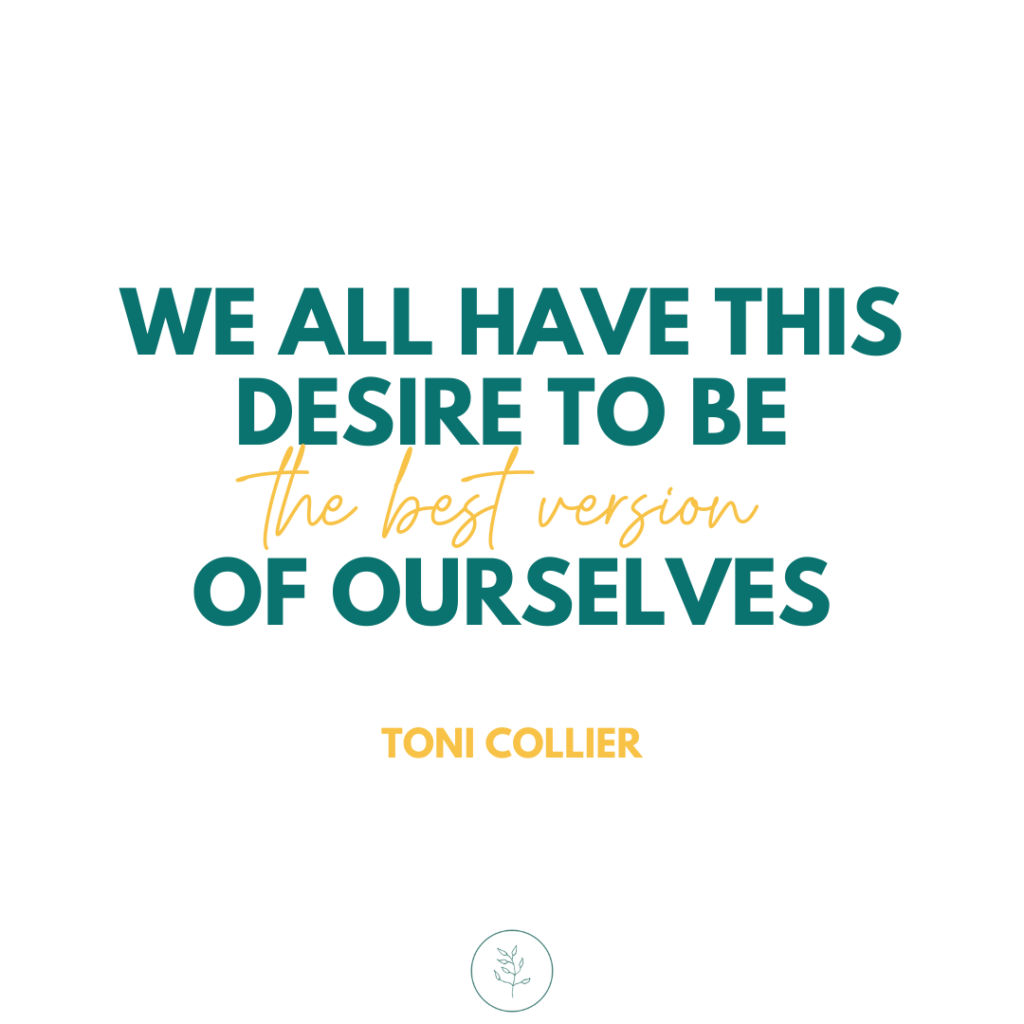
About a few other things…
Do you struggle to create habits that stick? It’s not your fault. The truth is simple: you’ve been trying to form habits using methods designed for perfect robots–not real women living real lives. It’s time to change that. If I could help you gain confidence in creating habits AND guide you to uncover the ONE supportive habit to deeply care for yourself, could you commit 21 days to learning this method? The Sticky Habit Method is a 21-day course that revolutionizes the habit-formation process. It’s real habits for real women.
Sign up for the Go Getter Newsletter to get Progress Pointers in your inbox every Tuesday.
This episode is brought to you by EveryPlate. Get $1.49 per meal by going to everyplate.com/podcast and using code ‘progress149’ and by Fabric by Gerber Life, apply today in just 10 minutes at meetfabric.com/progress
You can listen the episode below, or on Apple Podcasts/iTunes, Spotify, Youtube, Overcast, Stitcher, Pocketcasts, or search for “About Progress” wherever you get your podcasts. If you like the show please share it, subscribe, and leave a review!!
SHOW NOTES
Finding Me Academy
DSL Guide
Try me FREE Class and check out my NEW Habit Course
Leave a rating and review for the podcast!
Lend your voice and experience + be featured on the show HERE
Join Monica on Facebook and Instagram
Songs Credit: Pleasant Pictures Music Club
TRANSCRIPT
Monica: Toni, welcome to about progress.
Toni: I’m so excited. Thanks for having me.
Monica: I am too. I, I’m already so drawn to your energy and what you’re radiating and I know it comes from somewhere.
Toni: Yeah.
Monica: You know, whenever I meet someone like you, I’m like, there’s always so much more to this depth and this light that can I, I could just easily skip over cuz I think, oh, this is just who they are.
But no, I, I already know from you, this is hard earned. And that’s kind of what we’re here to talk about today is how you’ve earned this personally, but also what you have to teach women about moving through the heart and the brokenness. And so let me just start this by saying this is an idea, I think many women in my community are going to want to resist starting with.
Toni: Okay.
Monica: that’s owning our brokenness and, and almost starting from that brokenness as a way to, to progress, to heal, to grow. But we don’t wanna start there. We just wanna skip over the whole brokenness piece. So I wanna be hear, let’s just start with just your general thoughts on brokenness, and I also wanna hear more of your story connected to that too.
Let’s start with why do they need to not resist this? Why do they have to start with this owning the brokenness piece?
Toni: Yeah. Well, let me say this. I feel like I only have the authority to speak about this kind of stuff because I’ve done it wrong. Oh, I’ve tried to do it in one way. I’ve tried to be all things to all the people all the time. Show up, crush it, all the things. I’m a three on the Enneagram. Achieving was my way to go.
This is what I’m trying to say. Okay. Crush it every single day.
Monica: That’s my number, too.
I
Toni: am a winner. Okay? And the truth is, I failed because I started leak. Out of the brokenness that I was trying to stuff and hide and numb because it has no place to go. Okay. But out of our control, out of the overflow of our numbing, of our, like stuffing things under the rug.
And so there was a moment when I was leaking and it was just too much to handle. It felt like the bottom was falling out. Kind of like when you’re like trying to carry all your laundry at one time and like the freaking socks fall out, and all the little things, like my unhealth started to do that all over my relationships, all over my family, all over my career and everything that I was trying to be perfect in.
And then I was forced to go down this excruciating, painful, not linear journey of healing, and I realized, Actually, when I learn to embrace the pain, embrace the brokenness, I actually go further faster because I’m more to handle anything that comes my way because I’ve gone through the hard, gritty work of healing.
And so when hard times come in the future, I can sustain. I have strategies put in place for me to. Win at it. And so I would say brokenness and embracing and embracing the pain on the forefront really does what we want all along. It gives us the grit that we need to endure and to fight and to come out on top as winners anyway, so, yeah.
Monica: Okay. I have like 10 questions that I wanna, go towards, but let’s start with this one. I, I, I’m curious why this was the case for you. Why were you afraid of being broken? Like, what, to you, what
Toni: reasons. Yeah, a few reasons. I, I grew up with a dad that was never proud and also verbally abusive. And so all I wanted to do was just make him proud. I was captain of the cheerleading team. I was on the debate team. I was in program counsel. I was in thespian society, acting, doing everything to say, look at me, look at me.
Someone say, I’m proud of you. And. When my dad didn’t, I just turned to other things. I lost my virginity at 13. I started drinking and smoking and living kind of this double life where I showed up and I was perfect and I was doing everything great. Graduated high school in three years at 16, graduated college at three years and at 19, like I was.
Crushing it. But the only way that I was crushing it was through numbing, was through hiding. And, and I wanted to, because I wanted someone, anybody to say, oh, Toni, I’m so proud of you. Look at all that you’re doing. Look at all that you’re able to hold. And I realized that it was just shallow, that I was really.
Wanting to be praised for being in agony, for being burnt out and tired, versus an overflow of that, a healthy person, a person that works on the offense, not the defense. And so, yeah, I just wanted someone to be proud of me.
Monica: Isn’t that the heart of a lot of what we struggle with is just wanting that approval to be seen, to be validated. And, some of us can get that on the outside too, from what everything you explained, like weirdly, your avoidance to embrace your brokenness is made you more broken. That pursuit of a standard, of a metric, like please, Show that I am okay. Now, you’ve brought up a few times like what we do when we’re avoiding being broken. You talked about numbing, can we break down some of those things a little bit? Like for the women who are like, I’m fine, I’m not trying to avoid brokenness. Can you kind of like, no, here’s what you need to look for.
This is what it looks like when you’re avoiding this.
Toni: Absolutely. Well, our idols or the things that we use to numb are typically the thing that we’re using to not be in pain. And if we don’t get it, we’re either angry, sad, we feel incredibly unsafe out of control. And so for me, that’s looked likes. So many things. At first it looked like drugs and alcohol so that I wouldn’t have to feel the ickiness of the darkness in my story.
Then it became normal things, like I was like, oh, I’m healthy now. Like I don’t do drugs anymore. No alcohol. I’m not like going too crazy. Well, then all of a sudden it was like, man, I’m really shopping a lot. Started looking at my bank account. I was like, ah. Dang it. Like I, I’m doing this because I’m numbing.
It also looked like TV a whole bunch. I’m not really a TV kind of girl because I wanna be efficient and effective, and so I wanna work all the time. Well, TV became that for me so that I could distract myself from reality by going into someone else’s reality. That’s actually not the reality, cuz it was television.
Okay. . But then also work like drowning myself in work so that I escape the pain. It is simply the things that we put in place to keep us from being in pain, to keep us from facing realities.
and it’s so easy to do,
Yeah.
Monica: there are things within, literally within reach of our hands, even with these phones, right?
Toni: Scrolling, all the things.
Monica: So that’s something they can start with is just being aware of the numbing behavior, but also coupled with that it’s sneaky ways of numbing through productivity, through achievement being on that hamster wheel.
So you, you reached a point where that you couldn’t stay on that anymore. What did it look like from there for
Toni: Yeah. Well, the truth is, one of the reasons or the, the person that I really started healing for wasn’t myself, because I don’t even think I had the courage, the bravery, the maybe even security and confidence to feel like I was worthy of going down this healing journey and being better and more whole.
It was my daughter. I remember, you know, I was in a marriage, really toxic and abusive. . I remember seeing fear in my daughter’s eyes for the first time and I was like, whoop, gotta get out of that. But I got out of the marriage and was still feeling anxiety and stress and all these things, and I said, well, that’s really weird.
Like I thought if I just got outta the environment, I’d be fine. Well, no. Okay, because you take you with you, you also take all the wounds that you’ve developed over the years, all the ways that you suppress and numb over the. So that started spilling out into my parenting, into being really hard on my daughter.
And, you know, just getting into arguments with my parents, I mean, all kinds of things. I just took myself out of a toxic situation into normal situations, and I started hurting the very people that I loved, and I started becoming the person that hurt me in the first place. And so from that place I was like, ah, like.
I want to be better. I wanna be more whole. I want the relationships that I do still have to experience the best and most full version of me. And that was the point where I was like, okay, I’m gonna go get some help. And and it changed my life, not only for me, but for my daughter as well.
Monica: Thank you so much for sharing all that. It’s, you know, my path isn’t exact same as yours, but I really relate to a breaking point. You know, and realizing it’s a bigger picture. And also mine’s connected to my kids too, and seeing like, oh, this is not who I wanna be as their mother. And I think the women who are listening, you know, who are wrapped up in the behaviors we talked about, but also seeing that come to Jesus moment, right.
Of sorts, where they’re like, this is bigger than me and I also need to rise up to it. I, I want you to just help them understand why starting with a brokenness is empowering, cuz that seems really contradictory. Why is it not contradictory?
Toni: Because, well, I mean, first and foremost, you don’t need a whole bunch of courage to be perfect. I mean, let’s be honest, like, gosh, we can show up with our highlight reels and all the things, and that’s effortless. Like, look at what I’ve done, look at what I’ve achieved. That’s, that takes no grit. That takes no real courage or bravery.
It takes bravery to look someone in the eye and say, I’m battling with addiction. I’m battling with anxiety and depression and, and I’ve been stuffing it by myself for so many years. That takes real bravery. For most of us we, we want to – I mean, the truth is we all have this desire to be the best version of ourselves.
Unfortunately, society has made it seem like the best version of ourselves requires perfection. It requires us to be perfect all the time. Like that’s the key to antidote, to success. When truly it’s surrender, it’s being able to say, I’ve overcome this. Hope rises from the dirt. Well, if we’re not willing to get our hands dirty, to go through the real hard things, then we actually can’t hold up the badge and the honor of, look at me.
I’m a hopeful person. Look at me. I’ve done some really hard work. No, you haven’t done your work. You’ve been playing perfect. All the time. and that’s just, we just have to get over that, like that facade, you know?
Monica: So in many ways, embracing our brokenness is surrendering to being human.
Toni: I’m like, surprise. Here we go, . It’s saying, I am imperfect. I love Brene Brown says this, I’m imperfect. We are wired for struggle, but we’re still worthy of love and belonging. Well, how much more does it mean to be worthy of love and belonging when you’re imperfect? It’s real easy to love, like the perfect person, the little teletubby friend that we have that’s smiling all the time, you know, I call her like a Susan.
She’s a Susan. Okay. She brings charcuterie to every freaking thing. She’s amazing, you know, but it, but it’s like, it’s so easy to love her. It means so much more when someone can look us in the eye and say, I know everything that you’ve been through and I still love you the same. And just like sit with that, like, that feels good to be like, dang, all my stuff is out there and I’m still so worthy of love and belonging.
Oh, that’s good.
Monica: That’s something you are connecting the dots for me too. I, I, I’ve talked about this in like a workshop I used to teach just how perfectionism is a shield, you know, but it’s also a, a weird pedestal and no matter what you’re removed from people. And that’s what you’re missing out on is, are those relationships.
So they have that to look for on the other side. I’m, I’m really wanting to know though, Toni, how did you do that ? Like how did you surrender to your humanness and then what did your, your progress look like from there?
Toni: Yeah. Well, the first thing that I had to do was become aware of what I brought to really painful situations. It was this idea that I, I didn’t really want to be a victim anymore. I didn’t want to have a victim mindset. And the truth is, when you go through abuse for whatever that looks like, you are a victim.
But you don’t have to attach that as a defining word to yourself. You can overcome and all the things and. The first step for me was becoming aware of what I brought into it and where that came from. There was a reason why I kept ending up in abusive situations, like my dad was verbally abusive. And at 13 I lost my virginity to a sexually abusive man.
And then I got married to a verbally abusive man. I mean, and then I go to a church to this abusive pastor and I’m like, well freak, like, wait a minute. Like there’s something here that I am bringing into this situation. There’s something that I’m attracted to in the, on the other side of that as a shadow side, and I need to figure out what that.
Well, it was control because I felt like I had no control over my life as a little girl because darkness entered into my story and I was just looking for someone like a father figure to control my environment so that I wouldn’t have to work so hard. I looked for that in other men, and so that, that aggressive traits, those little, you know, controlling traits that are not good on the other side is what I looked for and I was attracted to.
So awareness is the first step. Well, how do I become aware of what I bring into situations into my life? Well, you gotta have a guide for that. Oftentimes, that’s a counselor, okay, to help piece the things together that’s underneath the surface that we just don’t freaking know. Like I’m a normal human being.
I don’t know what this stuff, I don’t know what neuro pathways are and how it’s, you know, divinely connected into my brain, into my actions. I don’t know that stuff. So I go sit in counseling and I’m like, teach me how. And the truth is, the best leaders are the ones that look for. So they won’t have to go through a really, really hard journey to get on the other side.
You wanna be a leader, go get help so that you can go further faster. And that’s what I did. And from that place, it looked like changing my community. Like I had toxic friends that were, you know, feeding all of my toxicity and my bad behaviors and my numbing and all the things. And so I had to change community, move some people out of the way, process through what does it look like to get new community as an adult, which is freaking.
Monica: hard.
Toni: Oh my gosh. Like be my friend. What are you talking about? A 35 year old lady, you know, like, it’s so weird, but it’s so needed if we’re going to just live the most whole life possible.
Monica: I love how practical those are, but also big too. Like these each are gonna take time. Right, but it gives them some steps to take on this path towards healing. And ultimately that’s what your goal is in helping women is, is to heal. So let’s go back to another resistance point that women, they want the healing.
They don’t wanna embrace the broken. We’ve discussed, you know, a lot of that, but one of the big reasons I think is because they’re afraid they’re gonna. Like, if I
embrace the broken, then I’m giving myself permission to just luxuriate in it and I will become the victim. You know? You know, and I, and I’m afraid of doing that, so I’m just gonna keep numbing or keep being overproductive and keep striving and, and still, you know, letting myself back into this brokenness I’m trying to avoid.
So how, how do they not stay there?
Toni: Well, let me just first and foremost say this, like sometimes you do get a little stuck. Like sometimes you run up against something in your past. Yeah, my gosh. And you’re like, whoa, I hate that. That really took me out. We have a women’s sports that we do. We walk with women for six months through a healing journey.
And step two at the very beginning is story mapping. And they always get stuck there. They’re like, Nope, I don’t want to think about eight year old Toni. I don’t wanna think about what that, what I went through. I don’t wanna think about that darkness that was in my story. Because if I think about that darkness that was in my my story, then it’s gonna be true.
And if that’s true, then that means I wasn’t worthy of protection and I don’t wanna do that. And they get stuck right there. And I’ve had so many women that’s like, I wanna schedule a separate call because I am stuck. I just wanna validate that because it is a. Right, like it is actually a valley. But the truth is, or and the truth is, let me not say, but cuz we don’t wanna be avoidant of that.
It’s, and the truth is that resurrection has no power without death. We can sit in Saturday in the valleys and say, okay. I am here. And when you’re in that stuck valley, that’s when you have the opportunity to say, who do I have that can be with me in the valley until I can claw my way out. I have my friends, I have safe people, I have my counselor, I have Jesus.
If that’s your Steelo like. I, I can be in this valley and I can be okay in it. And if that’s the whole idea of my new book, it’s embracing pain. It’s literally swimming and waiting through the depths of really hard things because it’s in that place again, that we build endurance and grit to make it on the other side so we don’t end up in another valley.
Okay. , you know, so I would say it’s fine.
Monica: We’re connecting to something. If we’re just looking at this market-wise, I always joke like it’s really hard to sell what I, what I preach because I’m saying you, you’re gonna get stuck and you’re saying that too.
Toni: yeah.
Monica: It’s part of, you can’t skip over it.
Toni: No, no, no, no. It’s fine. It’s fine.
Monica: so with this, I’m, I would love to know what you do when you’re in that stuck valley. talked about friendships and having that community. Anything else that helps you through?
Toni: Absolutely there is a a, a strategy. It’s a neurological strategy. It’s called Internal Family Systems, and it’s incredible. Dr. Allison Cook has done tons of research on it.
Monica: heard of it.
Toni: oh, it’s so good. It’s called Boundaries for Your Soul, is her
Monica: Wow.
Toni: and the whole concept around it. And some people are like kind of weird about it, especially, you know, Christians.
The whole concept around it is that the truth is there are parts of us that make up the whole of us, right? Like there’s little Toni’s all over the place. There’s eight year old Toni, 13 year old Toni, 16 year old Toni who left her parents’ house and was striving and trying to go to law school and all the things they’re, we are made up of all the parts of us.
Well, oftentimes what we do when we’re numbing is. That we like try to get rid of those parts. We don’t want to experience that thing. We don’t want to experience insecurity when someone else gets a promotion at work and we don’t. But that insecurity still is a part of us that revs up that jealousy, that thing.
Well, when I’m in a valley, I try to figure out, let’s just say I’m in a valley of jealousy. I try to figure out what’s happening with that part of me. Where did that come? What? What is she thinking? What is she so afraid of? Well, when did she even show up in your story? Well, maybe it was when I didn’t become the captain of the cheering team after I worked really hard.
Maybe that’s where she first showed up in my life. Well, what does she need to hear? Maybe she just needs to hear for once that. She’s enough that even without the title captain, she’s awesome and she’s loved and she’s worthy. And so in the valleys, I really try to like go internal and like
Monica: Yeah.
Toni: ask like what part of Toni is hurting right now.
And I tend to her because the truth is we throw her out of the house. We don’t invite her to the tables because it’s icky and it reminds us that we have some dark parts. But if we were to tend to her, Our current cells need tending to. Maybe she wouldn’t rev up so bad. Maybe she wouldn’t be so angry.
Maybe she wouldn’t show up anymore. And so yeah. Internal family systems on the money. It’s so good.
Monica: Okay, we’ll make sure we link to that in the show notes, but I love how that’s going back to your first tip for these women was awareness. You know, just getting aware of like what’s actually happening here that’s maybe deeper that I don’t want to. To look at, but needs tending. That’s another word.
Beautiful word tending. So for the women who are ready to tend to themselves a little bit better and to do these things, can we talk about the time aspect of this that, you know, time is, that’s a big part of this healing journey.
Toni: No, I know. It is the thing that bothered me the most. I was like, wait, you telling me I have to take an hour out of it every single week and maybe sit in the counseling office and sit and talk and ruminate? I’m like, okay, well how can we like make this a little faster? And the truth is, out of that place is when I created my women’s organization, broken crayons still color, because I was like, there has to be a more succinct, at least way.
Well, the foundational truth is that healing is not linear and it’s extremely painful period. That’s it is what it is. Okay. However,
Monica: to embrace, right?
Toni: it’s just, it’s what it’s, it’s what? It’s well, but also there can be some easier ways, a roadmap, which is also what the book is. It’s a roadmap that can kind of put some guardrails around this thing so that we’re not wandering all over the place and wasting our time.
It can be efficient, but within your story, we can’t place a time. We don’t know how long it’s gonna take. That’s called the pain comparison trap. Well, she healed from this really quickly. Well, she did the, her story looked like this and she just went to one counseling session and was good to go. We have to, I mean, we, we just can’t compare.
I mean, we just, you know, we can’t compare because we don’t really even see what’s happening. But we also can’t compare because it robs us of the ability to heal in the timetable that we actually need to heal on. And so I would say this. I would say for those of us who value us, Efficiency, delayed gratification has been something that I literally, verbally say I’m grateful for.
It helps me. I don’t know why, but it helps me. I wake up sometimes when I’m practicing gratitude and I literally say I’m grateful for delayed gratification. The surprise at the end of the painful, dark tunnel. I’m grateful for that. Why am I grateful for that? Because I’ve experienced delayed gratification.
And the truth is in the moment, it’s freaking awesome when you’ve been waiting for something, working for something really hard, and then you get it. It’s like, oh, sin snap. This is amazing. I work for this. It’s here. We don’t like the beginning, but we dang sure like the end. And so if we can keep the end in mind, if we can K, keep the delayed gratification in mind, I think it’ll help us with time.
I think it. And just be kind to yourselves. Okay. ,
Monica: and yeah, that valley, those valleys sometimes are a lot longer
Toni: Yep.
Monica: they, they almost seem like planes. You know, when you’re just, you keep, you keep walking, you keep tending, you keep trying. But I think what I hope women are taking from you especially is that they’re list as, as they listen to your experience is that, hey, there’s gonna be a summit on this other side.
Like you’re, you are gonna get there.
Toni: Yeah. Well, I think it’s hope. It’s hope. When we don’t have hope, it really is us essentially saying that it can’t get better.
Monica: Mm-hmm.
Toni: so we have to keep hope in the forefront and the, the way that we do that. Here’s another practical tip. The way that we keep hope alive is that we, we make sure that we look back at the little.
Monica: Okay.
Toni: me, I’m like, if I don’t have abs, there’s no progress here. You know what I’m saying? I’m like, if I don’t, if I can’t see ’em cut out, then there’s no progress. But what I should be grateful for is that I can wear these jeans that I’ve been wanting to wear and yeah, we don’t have abs right now.
Sweet girl. But you can slide these jeans on though. Hello somebody. Let’s celebrate the little, and so I think we do, that’s how we keep hope alive. We just celebrate the little like, oh, look at that.
Monica: Even the smallest signs of progress. I, I think to me, like, we just like to jump over those and, and, and not even notice them, but you’re right, like it’s, so that can be the fuel. To the fire. We need to, to go through those valleys that turns in, turn into planes. Thank you for bringing it back to hope.
Can, can you give us a little bit more of, of hope though too? Like, tell us what’s, what’s on the other side? I don’t think you’re arrived. Like, you’re not like I’m 100% like gone, don’t have to progress work anymore, but still what’s on the other side of the planes that you went through?
Toni: Oh, so much goodness. Well, let me say this. First and foremost none of us have ever arrived. Surprise, guys, you’re not gonna arrive. Okay, sucks. Bubble popped. It’s gone. We’ve never arrived. We are always arriving. but what’s on the other side is goodness, so much. Goodness. One of the, the practical things is the way that I parent my daughter and seeing her, oh my gosh.
Seeing her be honest and vulnerable with the things. We just had a four month old little baby, and she came home, thank you, and she came home and she’s crying. She’s so grateful. And about two weeks later she’s like, I’m jealous. I am. She’s like, mm-hmm. I’m jealous, mom. And you know what my first instinct could be like, oh, brush that off, because that’s what I did.
That’s what I thought was acceptable. And so that’s what I did to my daughter. Oh, no, no, you’re fine. No, no, it’s all good. You shouldn’t be jealous of your brother. It’s just a totally fine. It was such a special moment when I sat down with my daughter and. And I said, what do you think’s making you jealous?
Like what do you think’s behind that? And she said, well, I mean, you guys just like hug him so much, you cuddle so much. I said, do you want more hugs in a day? Do you want, you know, us to just hug? She goes, yeah. And I get emotional about this because. It’s everything that I needed at eight years old. She’s eight years old now.
It’s everything that I needed and wanted. It’s everything that no one asked me for. No one sat down and tended with me for, and I get to do that for my daughter. And that did not come from anything I experienced in my childhood. Anything, any brokenness. What it came from was the health that was on the other side of embracing my brokenness in my past.
And now we’re just hugging like nobody’s freaking business and it’s great. Yeah.
Monica: made this non crier well up with tears. So that’s . You get a trophy for that one. Toni.
That is
Toni: I win. Okay.
Monica: Oh, and that’s the bigger, you know, we’re circling back to one of the hard parts about avoiding brokenness is the lack of connection. on the other side is connection Starting. Connection to yourself, but those that really matter.
That’s beautiful. Thanks for sharing about that. I, I like to make sure we end with one doable, super practical way women can begin. And of course we’ve had a lot of great practical tips, but we’ve also talked a lot about kind of like abstract things. So if there was one small thing that women could do to start, what would that be?
Toni: Yeah, I would say create a replenishment cycle. The Tom Patterson Institute has this life planning thing that you can do. It’s like thousands of dollars and whatever, but I’m gonna give you some free nuggets right now. A replenishment cycle essentially is how you can begin to make space for living a life on the offense, not the defense, instead of being so reactive to everything that’s happening.
It’s kind of like putting something in the reserve in my personal replenishment cycle. It is written out like a little graph, and it at the bottom, it, it lists all the things that really give me life, like things that I don’t have to do, but things that, you know, that just give me life, that just make me feel great about my self.
And one of those things is nature. I love to be outside. I love anything, nature, canoeing, kayaking, all the things I did, going for a hike that fills me up. Another thing for, for me is getting my hair and nails done. I mean, come on, vanity. I don’t care. Like I wanna be cute out here. It makes me feel like my best self.
Well, Now that I’ve identified all of the things that are in my replenishment cycle, I identify how often I actually need them. So I would go, I would keep a ledger over the month and say, okay, how often do I really need to get my nails done to make sure that it is actually replenishing me well, every two weeks.
How often do I need to get my hair done every two weeks? How often do I need to go out in nature two to three times a week? Not once, not every other week, two to three times a week. I need to get outside, learn that the hard way during Covid. Hello, somebody.
Monica: know.
Toni: and then I do it. I execute it. It’s teaching me self-care.
It’s teaching me how to be aware of things. It is equipping me for when stuff hits the fan, cuz stuff be hitting the freaking fan. It is what it is. And so, but I have a reserve, I have resilience that’s backing me up, that’s filling me up. So I would say girls create a replenishment cycle. Do it.
Monica: that is awesome. I’d never heard that phrase before, but so much of what you spoke to is, a difference maker in my life too. And, and I honestly started back to just so something simple like that can be so helpful. So Toni, we need to talk about your book and, and I also wanna make sure we, we lead people to where to find you, but brave enough to be broken.
Can you tell us more about your book?
Toni: Yeah, I freaking love it, man. Here’s what I’ve been saying about the book. The book is not about my story cuz I can tell my story all the time and I’ve put all my business out into the Internet’s world. I mean, it’s crazy. The book is about healing your story. And what I love so much about it is it’s not this freaking men memoir.
It’s not like, look at me, Toni, it’s, Hey, I feel you. I see you. I have authority to talk about this cuz I’ve been through some real dark things. Now, here is a roadmap so you can go further, faster. This isn’t a whole bunch of fluff. It is. Practical steps do this to get into counseling. How do you do counseling practically?
How do you transition toxic community out? How do you find new friends? How do you practice gratitude daily? Like all the things, it’s practical steps because I’m a practical patty. Okay. And, and it’s just for people that’s like, I don’t wanna, I don’t wanna leak on my family. I don’t wanna leak on my friends.
I wanna be the most whole version of myself. I am strong enough, brave enough to go through some hard things and come out on the other side better for it. That’s what the book is. Brave enough to be Broken. Yeah.
Monica: I love how you shared about that because I, I know that’s what it’s for. It’s for these women who are ready and, and, but your story does, I have to say like it does help so much. And I know you share it too as part of the book, you know, so that we can see not only the authority, but also where we’re headed and what it looks like.
So where else can they find you though, besides the book that we’ll link to?
Toni: Yay.
Monica: they go?
Toni: So it’s Toni j Collier on everything. T o n i j c o l l i e r on all the things Insta, website. I have a still coloring podcast, which I love, and yeah, and it’s Toni Collier on all the things.
Monica: Fantastic. We will link to all of the things. Toni, this has been a beautiful time. I’ve really enjoyed being able to connect with you here. Thank you so much.
Toni: Thank you.
